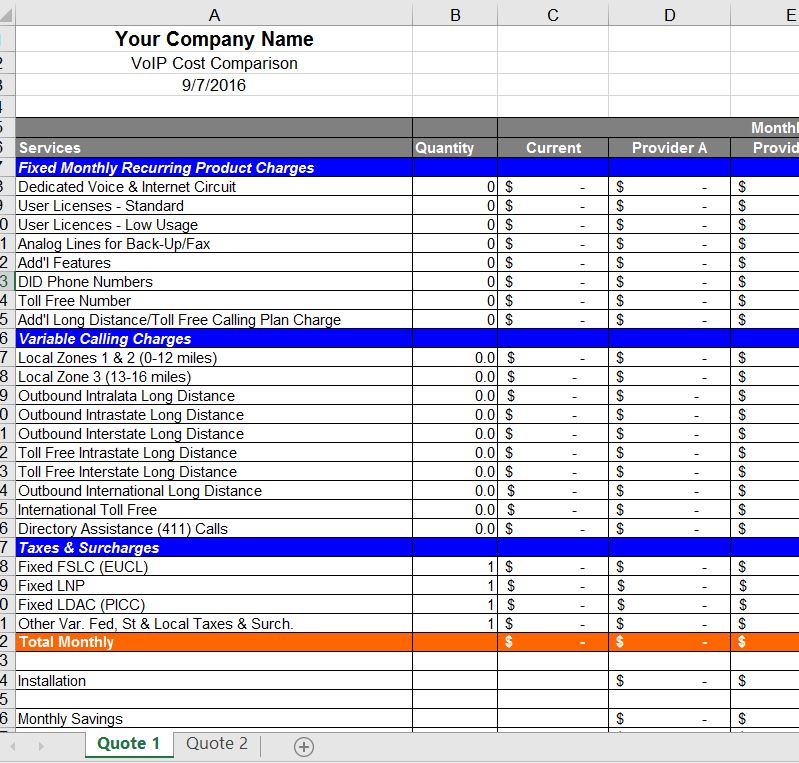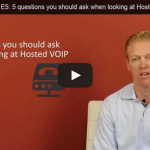Less Researching VoIP Providers… And Better Results.
Yes, YOU… IT Directors, Sys Admins, CIOs. It’s possible. Your company’s phone system is End of Life, outdated or just died or maybe your current hosted VoIP/hosted PBX service contract is coming to an end. Your management has decided the new system will be hosted. Now, which of the 500+ hosted VoIP providers should you choose?
This short whitepaper will help you create a solid plan that will result in your IT Department doing less work on research and making a better-educated decision. How did we come up with these 8 hacks? It’s all we’ve been doing at AeroCom, since 2003.
Learn 8 of our tricks and then learn more about us today at www.aerocominc.com.
Hack #1: Make a List of Features
Hosted Phone Systems have the capability of having all of the features of even the most sophisticated on-premise phone systems. But the availability of those features is going to affect your pricing and not all providers offer every hosted PBX feature.
For example, if you are getting a quote from a hosted VoIP provider that includes every feature (as standard), their pricing is obviously going to be higher than the provider that has a bare-bones offering. You also want to avoid getting quotes with providers that do not offer (or have issues with deploying), features that you need.
Every phone system feature sounds great, but which features are absolutely critical to your company and therefore, non-negotiable? Before you send your agent out searching for the first-round of hosted PBX service provider quotes, make sure you both are on the same page, in terms of which PBX features are non-negotiable and which are negotiable. Your sales agent should be able to give you a list of potential features you can choose from but here are some of the basics:
- Voicemail: Does everyone need a voicemail box?
- Unified Messaging: Do you need your hosted phone system to email a wave file (of voicemails), to the user?
- Voicemail Transcription: Do you need voicemails transcribed?
- Call reporting: Do you need real-time call reporting of calls going in and out of your hosted PBX? If so, what exact details do you need?
- Auto Attendant: How in-depth is your auto attendant? Is it a simple auto-attendant or do you need it to be an IVR (i.e. your auto attendant interacts with a live database and allows customers to get real-time account information without ever talking to a person).
- ACD (Automatic Call Distribution) Groups: Do you want to route incoming calls to a specific group of people (i.e. a sales team or customer service team)? If so, how advanced do you need this routing to be?
- Call Recording: Do you need calls recorded for training or other purposes? How many calls do you record per day and how long do you need to keep the recordings?
- Whisper Mode: Do you need to listen in on calls (with or without anyone knowing you are listening), for training purposes, then talk to your employee, without the customer hearing you? Want to do the same via IM?
- Software Integration: Do you want your hosted phone system to integrate with software? For instance, do you need the PBX to pop-up account information on your computer screen when a current client calls your customer service department? Do you need the ability to click-to-dial off a phone number in your CRM or Outlook? Want a phone call to automatically get logged as an “activity” in your account management software?

- Mobile Phone Integration: How much do you need your users’ mobile phones to integrate with your hosted phone system? Do you need them to have find-me-follow-me or do you want full integration, where the users’ cell phones can have nearly the same functionality as their desk phone (i.e. can transfer calls, etc.)?
- Reception Side-Car: Can your reception person use a soft console on their computer or do they need a hardware-based sidecar for extensions?
- Common-Area (Low Usage) Phones: Does your company have several phones that are in common areas like lobbies, conference rooms and kitchens, that are barely used? If so, you want to make sure your chosen provide has an option for a lower monthly charge for low-usage phones.
- Virtual Fax: Do you want the ability for each user to have their own virtual fax number?
- Analog Devices: Do you have conference room (starfish), phones or hard faxes or overhead paging systems? These devices will require ATA devices to convert the digital VoIP SIP trunks into an analog signal. Some providers charge for these and some do not allow this at all but this detail often gets overlooked on your quotes and only comes up after the project coordinator is reviewing your implementation.
- Mobile App for PBX Administration: Do you need to be able to make administrative changes to your phone system via an app on your mobile phone or tablet?
- Video: Do you need your hosted phone system to allow video calls on phones that have a video screen?
 Headset-Only: Do you have some users that do not need a hand-set and can operate via a headset and soft console (on their computer)?
Headset-Only: Do you have some users that do not need a hand-set and can operate via a headset and soft console (on their computer)?- Multi-Site Failover: Do you have multiple sites and want the ability for certain sites to take calls for one-another after hours or in the event of downtime?
- SD-WAN: Do you want your VoIP provider to supply you with an SD-WAN service and guarantee call quality?
- Management Tools: How much information does your IT Team want to see, from a management standpoint? Do they want to see hosted VoIP call quality down to a user (MAC Address), level or do they just want the information at the router level?
Hack #2: Know Your Usage Data
I know… getting your bills from Accounts Payable is a pain and looking through them hurts worse but it’s unavoidable. Just like with features, some hosted phone system providers’ pricing is stronger with specific types of usage patterns. Don’t get stuck for three years with a provider that’s going to gouge you on your usage. For instance, some hosted PBX providers offer unlimited usage per user but their monthly per seat cost is going to be higher and might not be a good fit if you don’t make that many outbound calls.
The good news… A good sales agent will figure all of this out if you can get them your bills. Here is the data they should find on your billing:
- Do you have a toll free number? If so, how many?
- How many Outbound Minutes per month does your company use for:
- Local Calls
- Intralata (Local Toll Calls)
- Intrastate Long Distance
- Interstate Long Distance
- International Long Distance (per country)
- How many Inbound Toll Free (800 #) Minutes per month does your company receive:
- Toll Free Intralata (Local Toll Calls)
- Toll Free Intrastate Long Distance
- Toll Free Interstate Long Distance
- International Originating Toll Free Long Distance (per country)
- Do you need any additional long distance calling features, such as Account Codes, Advanced Toll Free routing, etc.?
Hack #3: Know Your Company’s User Count…
An agent cannot help you with this one but it is important for you to know, up-front, how many phones you need at each site and what types of phones they are. Here is a basic list to get you started.
- Normal Call Volume Users
- High Call Volume Users
- Executive Team
- Reception
- Conference Room (i.e. Starfish Phone)
- Common Area (i.e. Lobby, Kitchen, Warehouse, etc.).
- Mobile Phone App?
Having this data up-front is essential in getting comparable hosted VoIP quotes from competing providers, on the very first round of quoting. Some providers price each of these user types differently and some bundle them all into the same per-seat pricing.
So, if you have a ton of Normal Call Volume Users but one provider has a one-size-fits-all unlimited calling seat charge, you will be paying way too much for all of your users to have unlimited calling that they don’t even need. Nothing like having five meetings with a provider that you could have eliminated day one!
Hack #4: Each Significant Site Should Have SD-WAN or a Private Circuit
Make sure to plan on using a cloud-enabled SD-WAN service alongside your hosted VoIP… or quote hosted VoIP providers who can install and manage a private, protected access circuit (i.e. T1, Ethernet over Copper (EoC), Fiber, etc.) at each of your sites that have more than five users.
Regardless of how large your Internet connection is, NO hosted VoIP provider can guarantee voice quality over the public Internet. Hosted VoIP traffic is very sensitive, real-time data and therefore, even the slightest latency, packet loss or jitter is going to ruin voice calls intermittently and will be unacceptable to your users. It is more expensive to use SD-WAN or a private circuit at each site but it is the only way to have consistent, reliable phone service. If your users can’t count on their phones to work, they won’t use them and you’ll be wasting any money you spend.
Not to mention the HUGE amount of stress it will put on your IT staff to “chase the ghost” of bad call quality… every day! The more users, the higher the probability that someone will experience bad VoIP quality with BYOB (Bring Your Own Bandwidth).
Hack #5: Compare the Quotes in an Excel Spreadsheet
A good sales agent should be able to consolidate the different provider quotes into a legible excel spreadsheet comparison, to give you the confidence that you are comparing apples-to-apples. This should be broken down by each feature included and all usage data, per your exact minute usage.
I cannot tell you how many times we’ve seen customers with separate quotes, trying to compare and then just give up and only compare the price at the bottom line. There are SO many details with a hosted VoIP quote that you need to list them side by side. CLICK HERE for a free VoIP quote template, like the one pictured above.
Hack #6: Demo at Least 3 Hosted Phone Systems
After getting initial pricing from several different providers, you should be able to narrow your search to at least THREE of your best options. Make sure to take the time to demo at least your top three either on-site or via a web conference. It is also best to have a few different members of your management team in the meeting, so that many “user experiences” are repre
sented and can ask questions.
Making “test calls” is up to you but it’s not as important as just having them walk you through the user portal, the admin portal and seeing the phones.
Although it may seem redundant, you’ll be surprised at how different each hosted PBX providers’ interface will be. The provider who’s pricing seems a little higher than the others might end up having an amazing user interface that makes up for the price difference.
Hack #7: Have a Target Price & Negotiate Honestly
As you are shopping hosted phone systems and you start to see pricing from several providers, decide on a target price. Your target price should be the price at which your company will definitely say “yes,” if all of your requirements are met and you feel comfortable with the hosted VoIP provider’s ability to deliver a great product.
Once you have seen all of the quotes and performed demos of at least three hosted phone systems, you should have a good idea of which provider is your top choice. If your number one choice is coming in higher than your target price, tell them that you had a target price on this project. Tell them the price and ask them if they can hit your target price. Tell them that they are your favorite but their pricing is not. You’ll be surprised how much your honesty will help your pricing.
If they are already at or below your target price, don’t grind them further. If you grind a provider unjustifiably, you will start cutting substantial commission and profit from your hosted phone system provider and agent, which (like it or not), will usually result in a lower level of service from these same people. Even if they refuse to lower their pricing, the negative impact on your vendor’s morale will stay. These people know their industry and know the competitive landscape better than you think, which means they already know that their pricing is fair and therefore, will be very frustrated that your company is asking them to lower their pricing, unjustifiably. Demoralizing your hosted VoIP support team is not worth doing if you didn’t need to do it.
On the contrary, when you don’t grind pricing unjustifiably, you end up with a happier vendor and a good client-vendor relationship is always worth it’s weight in gold.
Hack #8: Select a Good Sales Agent
DON’T start calling random providers and speaking to their front-line salespeople about their hosted VoIP solutions. There are over 100 hosted VoIP providers… so no matter what, you’re not going to have the time to call all of them, so why bother? Here is an infographic on the math.
Below are some of the benefits a good sales agent will bring to your quoting process that many IT Decision Makers are surprisingly unaware of:
- A good sales agent will get you the same or better pricing on the hosted VoIP provider of your choice. No, despite some untruths floating around, on-staff salespeople do not have access to lower pricing.
- A good sales agent will drastically shorten the buying process because they won’t waste your time with bad meetings with hosted VoIP solutions or providers that are a terrible fit.
- A good sales agent gets preferential treatment from the providers, which means better sales engineers helping you with your hosted PBX quotes, better project coordinators during your VoIP implementation and better support staff when you have a technical issue (which is inevitable in the real world). Providers have to earn the business of the agent.
If you don’t know of a good sales agent, and you found this article useful, please pay us back by contacting us and giving us a try. It’s free, so you have nothing to lose! I promise that we won’t let you down.
Happy Shopping! We hope this article helps you spend less time shopping for your companies hosted phone system and more importantly, helps you make a more educated and successful final decision.
Want to bypass all of this and have an AeroCom expert help you skip to the top 3 options for your company’s size, location and requirements? No problem! Just click the button below.
About the Author
Mike Smith is the Founder and President of AeroCom and has been helping companies with telecom and cloud services since 1999. He has been the recipient of numerous business telecommunications industry awards and in 2011, he was honored as one of the top 40 business people in Orange County, CA., under 40 years old. Follow Mike on LinkedIn, Twitter or SpiceWorks.








![How Your Company Can Get Great VoIP Call Quality [Infographic]](https://www.aerocominc.com/info/wp-content/uploads/2017/06/Infographic-Increase-VoIP-Quality-Featured-Image3-150x150.jpg)


![Which Phone Technology is Best for Our Company? [Infographic]](https://www.aerocominc.com/info/wp-content/uploads/2016/07/voice1-150x150.jpg)

![Shopping Business VoIP Mathematically [Infographic]](https://www.aerocominc.com/info/wp-content/uploads/2017/06/Infographic-Shopping-Business-VoIP-Mathematically-Featured-Image-150x150.jpg)